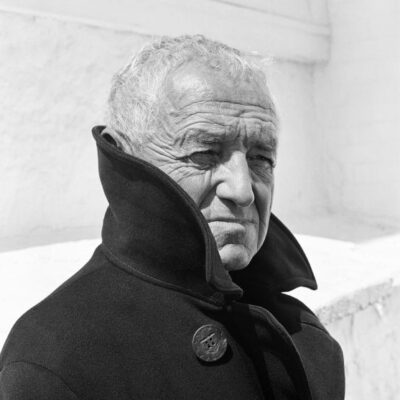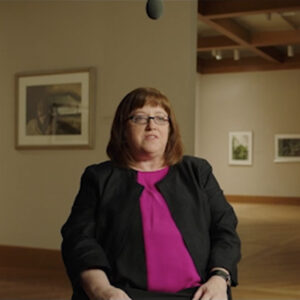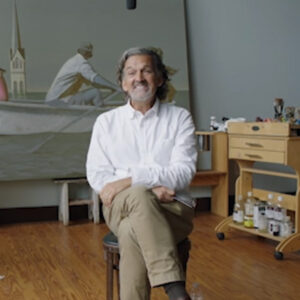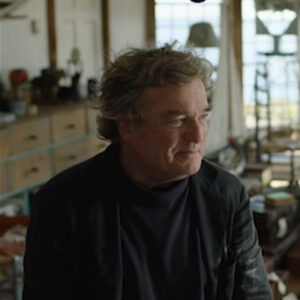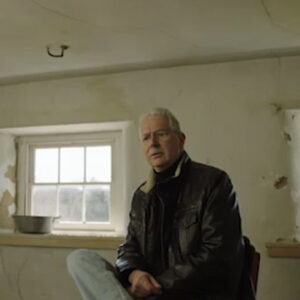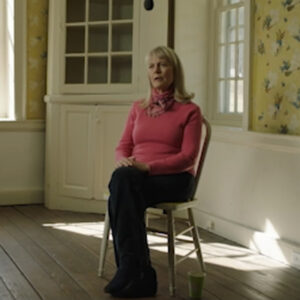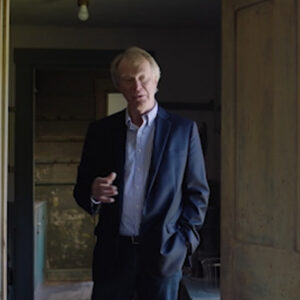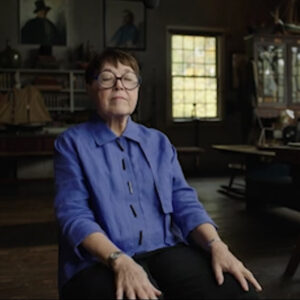Speaker Could you begin by telling me about how you know Andrew Wyeth well, hell, we were he was born on the hill next door, and his father and my father were good friends to dad. He is his father did a painting for my father’s bar and about.
Speaker And it’s hanging right there behind me, reproduction over what kind of kid was Andrew White, what kind of kid was he?
Speaker Well, he was just the same way as a kid as he was grown.
Speaker He was full of it and a life he just loved life and he loved to play like and he and his father were close and, uh, and, uh, and he he was his father was really teaching him. I think he made him pay that apple for a year or something like that.
Speaker And but we all we were all a guy. We were a gang over here. This was the real operating bar and big one.
Speaker And and our man went across the Brandywine and up near where they lived.
Speaker But they they we raised Jersey cattle and stuff and and we used to get two months of ice in the winter to skate on and you had to shovel snow off it.
Speaker But he the his older brother Nat was a terrific skater and and and and and he and ever Greg, who lived farther around the farm, did the bookkeeping and so forth. And we were all of the same gang and Bill Greg. And they were I think, one year apart. And I was three years younger and I got in the rumble seat while they took for the girls.
Speaker I don’t know whether Andy had a girl I don’t remember or the girl, but he. His all his brothers and sisters and everybody, we all.
Speaker On every Halloween, they’d show up all bandaged up, and you couldn’t tell who the hell they were or anything, and and they come to the front door of the house here and and you could know they were there about lovers, I’d say at least eight or nine of them. And they come for Halloween, you know, make noises. They always are jokesters.
Speaker I saw a famous picture of Andrew just as Robin Hood and his friends would play games like Robin Hood. And they said, you play those kinds of games. And if so, what did you play?
Speaker Well, we did. And we were we were a gang on the farm and we play hide and seek and stuff like that.
Speaker But Andy and his crowd would do things like we are talking about. And I don’t think I ever was, you know, that much. I didn’t particularly want to be.
Speaker But they and he really was in a painting from the time he was born. I sure. And I think he’s the best artist in the country. And, uh, I, I don’t know. We know very he’s always the devil. You know, I remember even here in the Brandywine Museum, uh, I bought his paintings when they were inexpensive, like five thousand dollars a stuff. And and I was there when I was in Congress and are in the White House. I work a little bit in the White House and a little bit and, uh, and a couple of years in a health, education, welfare and our house. I distinctly remember Andy. Asking me if I would loan the pay painting roasted chestnuts, which the study is over there to the President Eisenhower, and when I happened to mention that, I said, why don’t you tell a story about they didn’t even know it. And I tell you the truth, I don’t think I don’t think they know the full story yet. But the fact is they smuggled the end of the White House smuggling that they didn’t want anybody to know. And I didn’t want to be known. And he was teaching the president how to pay. We. Oui. Which is Eisenhower. And and so anyway, he asked me and he asked me what I lowering roasted chestnuts to hang in the Oval Office. And I said, sure. And, uh, anyway, they don’t they loaded there.
Speaker And I remember when I picked it up, uh, number of years later, uh, the, uh, the guy that gave it to me or somebody standing with him or something said, you know, that was one I heard the story that he was standing, looking at that pay, you know, me meeting. And he was concentrating on it, apparently. And he said, how in the hell does he do it anyway?
Speaker That’s the quote.
Speaker And but they became great friends and and he painted his portrait, of course. And, uh, uh, I don’t know whether it was his farm or whatever, but anyway. But they smuggled the in every quite frequently and nobody knew and nobody ever did know.
Speaker Until now, well, there’s no reason to hide it and I own the painting at that time, I hadn’t given it to the museum by then and I had to take Eddie would show up in the spring when I had bought three of these Tepper’s.
Speaker And and he would be with his brush, uh, taking the mold off of all of them, there’s egg yolk in the paint and in the mold, uh, you have to take it off. And he’d be here all day. And that’s part of the reason I had to speed up. Giving them to the museum is to preserve a he couldn’t have Eddie doing in itself. All he did it about four or five years, and that made me have to put it different. So we went ahead and gave it over anyway. But they, uh.
Speaker But when he was with the president, I know the two of them hit it off. I knew I played golf with the president once and. When I was in Congress and with my buddy, who was my age, we were freshmen and our leader asked covid 11 o’clock, said, you want to play golf with the president and chess with Charlie Halleck. And he was the leader like Ryan is now. Anyway, I.
Speaker I said, sure, and I had to rush back, get that. And then it was on the golf course is way to hell on the on. And I made a bad turn and I was five minutes late.
Speaker You do not be late with the president.
Speaker You typically Eisenhower having been in the military and all that stuff. And anyway I got there and I had to run right by him.
Speaker Uh, there were the first tee that made up the game at eight or and I saw I lost eight bucks. Anyway, uh, I got that hit and I got back and then I hit my driver, sliced into the woods and he turned to Charlie Halleck and said, you know, if I was as young as he is, it hit the ball like that. I quit.
Speaker I, I sliced the next one. Right. No, you’re right.
Speaker And and of course, they always had a Secret Service guy on each side of the rough and the out of sight with his tongue, a little Tommy gun and a golf bag. And they’d find your ball every damn time you could. But but Andy and he hit it off. And I think Eisenhower wasn’t a very good painter. True.
Speaker Can you give me an idea? Do you have do you know how many times he. Well, do you know how many times he met with the president?
Speaker And a lot. I don’t think anybody knows him because they didn’t record. The press didn’t know. And Andy, was it just that looked like a. a pass for anybody and Andy, but that was the deal that was made? I think both of them liked the idea of not being they could set their own schedule and do whatever they want to do. And it happened over a period of years. And and, uh, I well, going back when he was young, I, I didn’t see a lot of I had a. But we tracked him, the kids all new here. We had a gang, we had a football team play chess for had two girls on the team, and I brought a ringer out from Wellington who we did win. But anyway, the weed here. Oh, did you hear Andy had a picture in the window and Philadelphia of some store or something like that, and that was a big deal. And and and but Andy, I got to know Andy more later on than I did as a kid.
Speaker I just was so I was uneducated. I couldn’t even write at the age of in seventh grade.
Speaker And it was a progressive school. Tower Hill was run, if you wanted to work, you worked, if you didn’t want to work, you did. I was in the didn’t car and mother, my mother died when I was eight. And finally dad caught on to the fact that I wasn’t learning anything. And I think I could read the book Tarzan or something like that. And anyway. That was he sent me immediately to for six years to an all over New England school where they tell you at the end of two weeks for good measure and along with everybody else, their class. And and that’s where I learned and I think I was dyslexic and didn’t know, but I still graduated very near the bottom of my class. But I won the general knowledge prize. And you have because I used to read Time, Newsweek and Life, because my dad had me interested in what was going on in the world. And he was a big wheel and he ran production and the part in World War One and stole the formula for the powder. And 1915, at a luncheon in Holland from the Germans, he he he loved to tell a story. He dumped his martinis under the table.
Speaker They were playing him big time and he was dumping them under the table. And then they showed in this brand new plan and new new kind of powder and he knew what he was looking at. And so when he came back and this was in 15 in 1914, the war started and dad was put in charge of production. And, uh, uh, well, anyway, Dad was interested in whatever was going on, and he was 50 when I was born.
Speaker And his father was 50 when he was born and his father wouldn’t educate him, he wouldn’t educated and his brother, who was seven years old or did thank God, and he worked for his brother. And when he came here at age 30, he was president of one of the five high school companies. And anyway, a dad, I always when mother died, I always sit on his left, no matter what, who is there or what. And so I got interested in what was going on in the world and I got a good little education there. The second part of my education was three and a half years in the service, half as an enlisted man and after German submarine and half as an officer in charge of analysis to Third Man. And we did a lot of Okinawa and all that stuff.
Speaker I’m wondering if you could talk to me about what you like about Andrew Wyeth’s paintings. You bought a bunch of them. You’re still a big fan. What are the qualities that speak to you about the paintings?
Speaker Well, you know. Maybe I can best illustrate it to you.
Speaker Just working on some of the.
Speaker The.
Speaker The first one I Tempora, I bought. We got some stuff they don’t send Christmas cards.
Speaker We kept them, but it was James Loper.
Speaker And all my life and touring here on the farm, my best friend was a black guy. I had no prejudice of any kind. And Dad was in New York. Her mother was from. Florida Panhandle and but she died when I was eight, but I never remember anything, so I was brought up colorblind and I had a lot of good friends and just my best friend here died of cancer at 36. I saw him the day before he died. And he was going to live come hell or high water, but.
Speaker This James love her P.A. 1950.
Speaker It there’s a hole in the hole is the.
Speaker Face he did not use. He had an angry sort of face. The one he used with first, the painting where he had his clothes were all old fishhooks and stuff like that, and and he was looking up like that to the left. And over his head was Sekal. Big circle and over the circle was a white sky, and unless you are stupid, you knew what he meant and it represented a black man in 1950. And I think that painting or when I was running Abercrombie and Fitch, I had an art gallery up there and I put that painting up with this other face and let them look at what what I was going through his mind when he painted anyway.
Speaker Uh.
Speaker I think that’s symbolic of. Of the age, the condition of the black man in the white world or a slave? Former slave in a white world and any he had. No, no, he was just like me. He did it for family that way. He was. And there was no form of difference, just colored skin and. And I just think he actually got a rich guy to take 50 of his paintings, 70 or 100. I don’t know all black people down to Mississippi and stuck them in an art gallery down there and just left them there for them to look out for a while, just not long before he died. And it was you could tell that he wanted to do something about it and I wanted to do something about it. And we both learned a lot in our lives two and three times. Anyway, that was a bond, the unwritten one. And, uh, and I, I bought his first painting for 5000, second one for 15, the third four. So it took him a year to paint him. And a third. The third was.
Speaker Thirty five thousand, I said, and you’re getting too damn expensive and and now they’re self or God knows what, did he and you ever talk about that?
Speaker The fact that in his lifetime, which is very different from many artists, he knew success, he had financial success.
Speaker Well, a 5000 dollars for a painting in 1950 was not a financial success.
Speaker Now, his father painted and in the depression.
Speaker Twenty five hundred dollars was the cost of that ring back there, and the kids just sold for three million and I gave it to them and they sold it. And we know that we could get a really good reproduction. So we didn’t lose the art today. They were reproductions are so good, you know, I bet you’re ninety nine people out of one hundred. Don’t realize how that works. Which one they were looking at.
Speaker Oh, you fooled everybody in this room with that, that everyone thought that was the painting.
Speaker Well that’s not reproduce. That’s original. That’s original.
Speaker But you know, 5000 you said is not. But in his lifetime, his work got more and more valuable. And I’m just curious if he ever reflected on that with you. Well, I don’t think money means anything that he ever did.
Speaker And I virtually kept buying all the stuff that she could of his. And and she got a whole seller for all.
Speaker And I guess she’s going to split it up between the museum, probably, uh, but, uh, so he had his wife with a really good preserver, and they want an end of preserving anything out of the way just.
Speaker But he, uh, he knew what he was doing. And typical Eisenhower was a hell of a guy.
Speaker Really neat guy and.
Speaker I got to know a little bit of him, and he he said to me one time, damn it, Haskell, and that’s the best thing I ever said to me by anybody. And that was he hadn’t made it clear that he was for this piece of legislation. Actually, the student loan program and included was the national defense education, a billion and a half.
Speaker And I wrote the student loan part. I got Elliott Richardson to write it for me.
Speaker And he got 15 college presidents down and I did it and we put it in the bill anyway.
Speaker We it passed. And, uh, but the two weeks before I had to go see a president with my friend who was also in Congress, and I’d known him before I go to the same school I joined to.
Speaker And and and as we walked into the Oval Office, they said, you do the talking, which was not crooked, and said we of to set out in front of his desk. And I said, Mr. President, your your. Favor the National Defense Education Act, aren’t you? And we just played golf two weeks for four anyway. He said, of course I am.
Speaker And I said, well, you haven’t told anybody. damn it.
Speaker And he got up and walked into the press room and said, he’s four. And we passed the legislation and. And on the floor, we switched over to student loans.
Speaker They put a billion dollars in that order to pay to law an amendment, and they’ve educated 30 million people. And that’s just dandy. You know, I just some.
Speaker We’re going to do one thing with our camera and we’ve cut through the window, we just talked to Jimmy this morning. Did you? Yeah, he’s doing great. He looks fantastic.
Speaker We just went over there as Laura and I just see is a painting of far left. Have you seen it now?
Speaker No, I’m glad he’s doing that.
Speaker It’s perfect. I can’t say that about a painting, but it’s called Frolich, absolutely. I don’t know how this is just genius that created that thing, and he is in withholding like cars, but his face is really just an expression. You you just you’ll be thinking you’re just looking at him. Yeah, that’s great.
Speaker I’m wondering if you if you could talk to me. He said and he was the same as a kid as he was when his adult. You said he was full of it. What does that mean full of it?
Speaker Well, he’s always sort of a devil, but a nice devil, as you know. I mean, he he liked to raise hell about something and and not the main or anything, but just. And I think his father enjoyed it.
Speaker Her mother and sisters and all.
Speaker Would you see Andy painting around Chadds Ford? Did I say why would you see Andy painting around him?
Speaker No, I didn’t. I didn’t. I think he’s up on the hill, out in the fields. And I know, of course, there’s over at that farm that he paid so much of.
Speaker And and he he paid it within a.
Speaker I think he took the world it took a part of the world that was his part of the world that he understood in Maine and here he painted he painted by my boat when I sailed up back from the race and he was out there, he painted it and I just gave it to the museum to be used until I die. And then I hope that my son will give it to the museum, which I’m sure they will.
Speaker So you were just saying something interesting to me, because he did. He painted the world over and over and over again.
Speaker But the same places you have with different parts of life. In other words, I think he he he could go right to the heart of things.
Speaker He’s just he in his mind, he go there and he didn’t have many people write about him or or I think he got away with a lot of it. I hear is the best artist, I think. When you go to the depths of is a judgment about people and times, and when he painted a, uh, landscape, you could see all the things that were going through and his mind. And, uh, and it wasn’t when What’s-Her-Name crawl up the hill.
Speaker Uh.
Speaker You could see her that was important, but you could also see a lot of other things, and I think he he just had he had insight into life. He just had that. And I think got a lot of it from dad as dad. It was one hell of a guy, probably the greatest underrated painter that you can find. I mean, he. And I’m sure that the two boys will. When they say they’re all well known or very well known and the fathers to become well known because of the boys, why did he talk about it?
Speaker Because I think you’re exactly right about the way he can cut through the important things about life and show you, like, one thing that represents a bigger thing. Yeah. Talk about his ideas of art.
Speaker Was that just he wasn’t a talker. But you didn’t he didn’t avoid it if he felt comfortable with a person, I’d think he wouldn’t talk much to a stranger. I mean, he talk fine, but he wasn’t going to go in and he was very modest, a word modest isn’t exactly the phrase what it means. I mean, he just. The last thing he wants to be thought of as a big cheese, I think.
Speaker And what do you think the thing that he would like to be thought of? What do you think he would like his legacy to be?
Speaker I’d think he would like to feel that people understood what a page. And there’s there’s it’s I’ve noticed that it’s people are very slow to understand a lot of his paintings, which are complicated, really.
Speaker When you and I met for the first time, you asked me what I thought of Andrew Wyeth and I told you some ideas and then you said Andrew Wyeth is many things which I loved.
Speaker He talked to me about what you think that meant to you. He’s many things.
Speaker Well, many things I meant by many ideas. Not just physical, they were.
Speaker What he was, if he shows a guy O’Reilly crawl up a hill or the hell of a thing to answer your head if he saw his son in the field like this, is he wondering what his son’s thinking about, you know, at that age or any other son? Uh, I just think and he never went to a phony world. He never, never went out of his. I think I don’t know when he painted the nude, I painted the nude. I know Jamie said, did he score? I don’t know. Whatever. But anyway, I. I doubt very much if he did and I just don’t. I think they were great friends. I saw them together and times and he was. He just said he had the ability to paint a naked woman, and I just liked what he had to say about those paintings are stunning. Yeah, they’re from this one. You almost can’t see the person. You see the person. And it’s real. And then you start thinking, and he could do that. Yeah, it’s just thought a genius, I think. And I think his dad and he were I’m sure his father had the greatest effect on him of anybody and.
Speaker Maybe set for Beziers, but. Uh.
Speaker And he he and Jamie were close, right?
Speaker I think you’re right, his father clearly, he said many, many times how important his father was to him, which also makes me reflect on the fact that he lost his father in such a tragic way that he must have had an impact as well. Don’t you think?
Speaker Uh, I guess I guess, you know, it’s it’s hard to know. I lost my mother when I was a. He just walked into the room and. And said, your mother just passed away. She had a stroke and died in 10 minutes right in front of. And the hospital. And I also tried to recollect my reaction. And I didn’t have much. It just was so sudden and so complete. That I love my mother a great deal and. I never remember how she used to know how to use the switch, but mostly on my sister, who was five 1/2 years older and always in trouble and but. I just you know, it’s hard to say what happens to you when a sudden thing happens, like in the war. I know the guy the people I put ashore had one hundred and fifty percent casualties. The whole revision.
Speaker And that’s they kill everybody and have more replacements, but when somebody when you’re involved with a death.
Speaker You’re so consumed with trying to save the life of. It’s you you’re dealing with doing something, why something is happening. I think it’s. It’s hard to know what your reaction is going to be, I think it varies enormously. And I remember the last two days of the war, the head of the Seventy-Seven division, which we put ashore about five, six times.
Speaker Uh.
Speaker He didn’t show up and he was bunkered in with me, Lieutenant Colonel.
Speaker And.
Speaker I said, where the hell is Bob Corker and everybody looking around, and I said, well, he has just gotten too much for an eye to this day. I don’t know. I can’t believe he didn’t live. But you get I’ve had a nervous breakdown. My father had a nervous breakdown. He had one in 1918 and he got right over. It just got too much for him when I lost election to Congress. Eleven o’clock the next day. Yes, it went dark, sure. But I when the deputies came, took me away. I got totally over it. And I know one of my close friends who was bishop of Massachusetts and the cathedral in New York.
Speaker And, uh.
Speaker He was the leader in the church, the Episcopal Church.
Speaker And.
Speaker He had to get 17 shock treatments when some have. I know what happens the minute the minister’s turned against him, bishop he put in, but he totally recovered. But it took him about five years. And there’s a limit to all of us and. Highway, I don’t know.
Speaker We got away from Mandy, but it’s interesting, so I would like to hear from you. So I have just one last question. You’ve done great. I love the story about Eisenhauer. I love the story about your ideas, what Andy was able to do with paintings.
Speaker I’m just wondering when you think now that you knew him for many years. Who? Andy Wyeth.
Speaker I know him to die.
Speaker What do you think were the sort of the things that were consistent throughout his life if he was to leave a life story read and pretty consistent throughout his life?
Speaker I think, first of all, we had a good marriage.
Speaker And that makes a hell of a difference.
Speaker And I.
Speaker I don’t know, that’s an interesting question.
Speaker He became, of course, during his lifetime, he obviously became famous guy, and he always tried to duck in here and he didn’t want it written about him. He didn’t want to talk about him. And he kind of eased up a little bit, but.
Speaker Basically, he just wanted to be ready and pay. And and, of course, the was the connection to the people he painted.
Speaker Yeah, you know, all of them, I think he felt very close to.
Speaker And.
Speaker That’s a tough question to answer.
Speaker I think you did a great job. Uh, I think you answered it, uh, well, it’s simple.
Speaker He was a.. He wanted to paint.
Speaker Yeah, he just wanted to say.
Speaker He feared he could he he could paint fast.
Speaker I’ve never invaded my vote. We were having lunch and I saw him down on the point with his easel. I couldn’t figure out what he’s doing first, and he was looking for a sort of semi mountain down to the water. And I remember I walked up behind him and he said, Do you think that’s a stearn’s? A little bit long? And I looked at it and looked and I said, well, maybe a little, and he takes a piece of white paint and goes, Yeah, sure, it’s right.
Speaker The.
Speaker He’s a genius. He was a genius judge. He’s got a picture of Frolich, you won’t see it. I’m looking forward to it. It’s. He’s put him in, I don’t go for carriages, I think that’s a bunch of B.S., But they they, uh, they love the carriages and. And that was apparently there’s some more to me, something I never had anything to do with, but they he that showed Frolich doing that and putting his his hands, the whole thing is his wife said that he really struggled with that.
Speaker Of all of Andy’s paintings that you’re familiar with and know, are there any that stick out with you? I know you talked about the Lopa painting, but are there any other ones that stick out to you as something that sort of touched you?
Speaker Well, I bought the the roasted chestnuts was the guy there was a Chevron on the arm. And that’s, I think, why they thought it would be a good one for Eisenhauer and.
Speaker But. Well, he painted did you see the painting of the sketch he did to me right there? Mm hmm. And he took two days to do that.
Speaker And that’s all. So that to you in profile there.
Speaker But the one closest to the window is right there on the wall. On the left side. Oh, yeah. That’s my brother on the other side also.
Speaker And as Jamie, he always wanted to pay Jamie and Jamie wouldn’t sit for. Yeah. Jamie looked like an Indian. I’m sure that’s what caught it.
Speaker And he lives in Australia and he is in charge of an area bigger than New England.
Speaker And the Aboriginals are half the population and he communicates with them terrifically in overdrive.
Speaker Drive, nobody else did. Andy, Andrew Wyeth, was he a serious guy or did he like to laugh?
Speaker I just I was always just Andy while I had left feet. Well, you could he could he give you a service, but he is more sort of, uh, I mean, if you’re like cocktail terrorization, you know, he loved being a joke and things like that and. And I think Jamie got along well and yeah, and as a father, a serious. I only sort of know him. I just know him once or twice and when I go to the house.
Speaker But.
Speaker His father, his father. One thing about his father, he had three different ways of painting. You wouldn’t know if that same artist painted that painting. And he went through three pairs, apparently, did you mean actually physically the painting was different?
Speaker Uh.
Speaker You’re different, I guess, different paint for.

